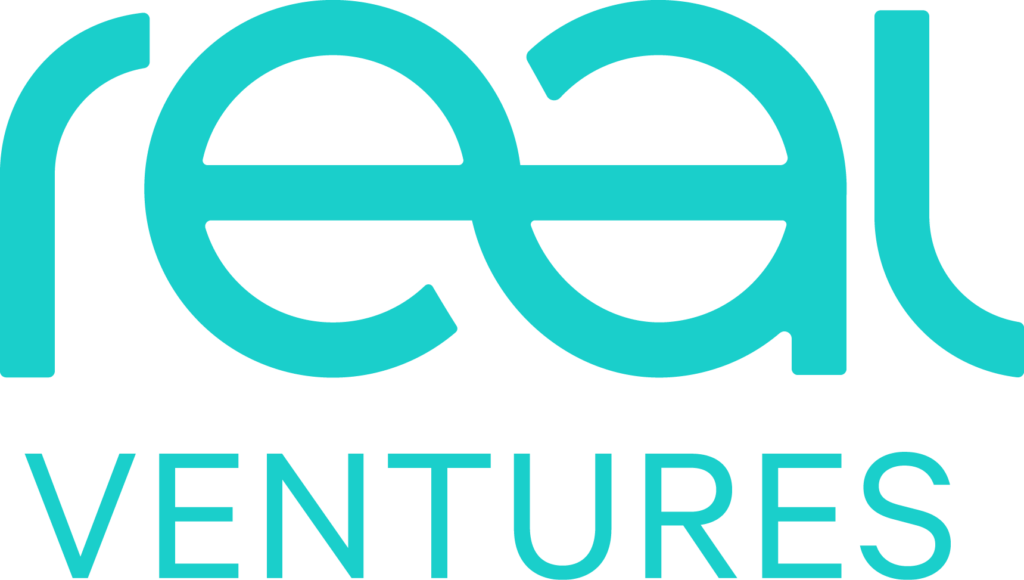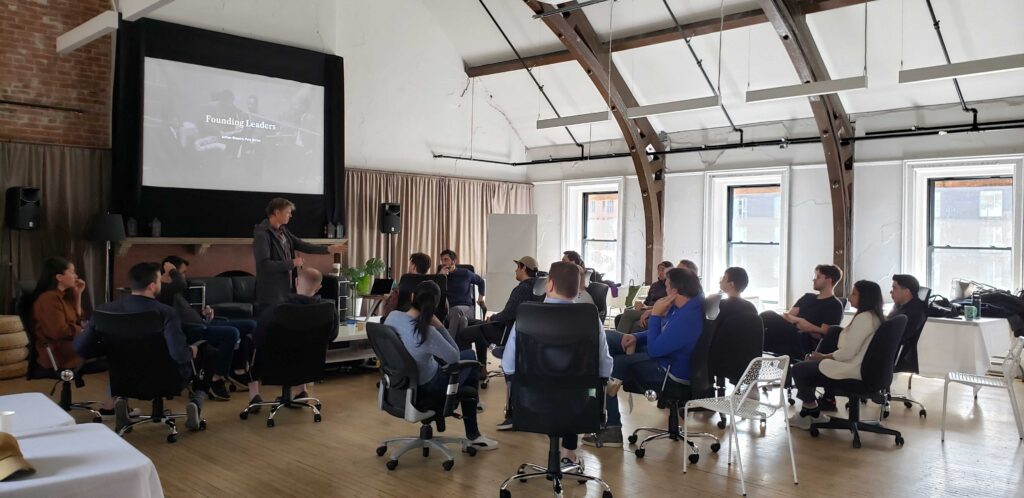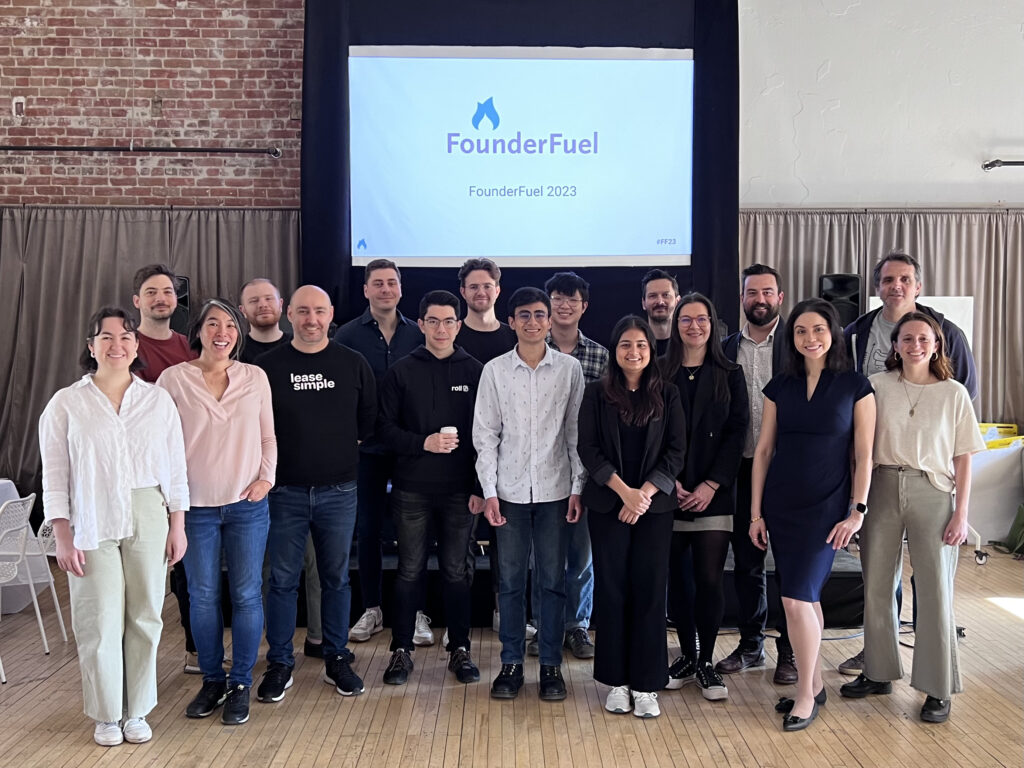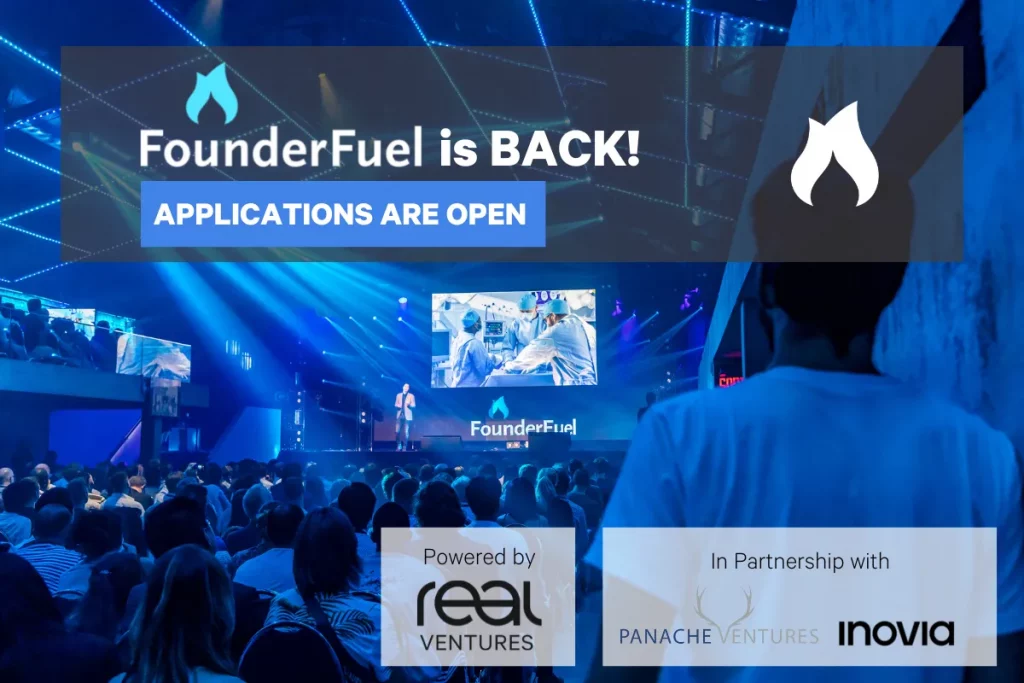Running a powerful and inspiring early-stage accelerator program is challenging at the best of times. Now imagine springboarding companies into hypergrowth, helping them strengthen and build their foundations all while a global pandemic starts to unfold.
Let’s set the scene. It’s February 2020 and we’re in the midst of finalizing the new FounderFuel cohort. COVID-19 has been on our radar but not in a big way. Suddenly, as if overnight, March arrives and the world (and Montreal in particular) goes from business-as-usual to a standstill with complete lockdowns. Incredibly, the outstanding and deeply committed FounderFuel community stepped up in ways we never could have imagined, helping to transform this 10-year-old accelerator into a completely new and enhanced version of itself.
FounderFuel has historically demanded a LOT of in-person participation. From mentor meetings to group workshops to our iconic Demo Day, everything was done in person. Our deeply held belief was that building globally impactful startups requires an in-person community. So what happens when that entire community is now driven to interact online? What happens to the spontaneous alchemy of human collisions when sharing the same physical space at Notman House?
During the first few weeks after lockdown, we were convinced that a virtual program could not be as good as the in-person version. But happily, hindsight is 20/20 and we now know that our initial reactions were flat-out wrong. The 2020 FounderFuel program was a tremendous success for everyone involved, especially our founders. We received the highest ratings when compared to all our previous non-COVID-19 cohorts. We believe it’s because this “unprecedented world event” gave us the opportunity to completely rethink our approach and to connect more deeply through this unique shared experience. Despite the uncertainty, we had so much fun learning and our companies felt they were able to manage their lives in an integrated way and balance growing their businesses while simultaneously deconstructing and rebuilding it to scale.
Here are our greatest learnings from this incredible experience and what we plan to bring into the 2021 cohort, which we are excited to start accepting applications starting in the fall!
The program is built on community
Given the major pivot to virtual, we decided up front to put all our cards on the table, in plain view to our sponsors, mentors, and even the startups. We believe that our open-kimono vulnerability coupled with our intense desire to find inspiring new approaches created trust and a sense that we were all in this together. We were met with positivity, confidence, and a willingness to think big and create novel solutions. We felt we were all in the same boat, and we are incredibly grateful that everyone was keen to start rowing.
Our sponsors doubled down on their commitment. Our companies became allies and co-creators in a brand new version of the program. There were completely new parameters and we discovered that in a decade of iterating, we had never really stepped outside the box and looked at the program from a completely new angle. Now, thanks to the feedback from the cohort, we can share what worked best.
Built-in Flexibility : Fixed, flex & free time
In a new reality that involved kids at home and social distancing, the separation between our work and personal lives and spaces disappeared overnight, we all showed up as whole humans at work, at home, and everywhere. We scheduled our fixed group programming in the mornings and made afternoons flexible for folks to book one-on-ones with their mentors, our sponsors, Katy, our General Manager, and other Real team members. We kept evenings and Fridays entirely open so the teams could allot that time to focus fully on their businesses and families. And the founders loved it. Compared to past years, they found it much easier to balance the program with their work and home commitments, we received an average score of 3.63/5, compared to the traditional format which received a dismal 1.63/5 score for balance in 2019. Though this is a good progression, we still acknowledge that this is an area for perpetual improvement.
Conscious Leadership
A focus for FounderFuel 2020 was the introduction of conscious leadership — a new programming decision made long before the COVID-19 shut down the world. This turned out to be one of the most important and relevant components of the program. Founders who have the capacity to inquire within, to understand, and be self-aware of their impact and influence on others (eg. co-founders, team, investors, clients) build much stronger companies that can stand the test of time — they develop the mental agility needed to better deal with challenges like global pandemics. We worked alongside expert coaches from Made to Tilt to fully integrate conscious leadership into FounderFuel. Founders noted that it served all aspects of their lives, with several of them choosing to continue coaching for themselves and their teams after the program.
Mentorship
A silver lining of COVID-19 was being able to disregard geography for mentors, this resulted in a much broader mentor pool than we’ve ever been able to offer. We also decided to ask mentors what areas they wanted to coach in and also asked the startups where their biggest pain points were, then we custom selected a set of 30–40 mentors that were unique for each startup’s needs. These high-quality one-on-one meetings allowed for deeper connections and exchanges than in past years where 4–5 mentors met each founding team as a group. This more tailored approach enabled better outcomes for both mentors and founders. We even had a mentor from as far as New Zealand!
Social Cohesion: Formalizing the informal
How do you create a community feeling without the impromptu connections and conversations that would normally happen at Notman House between sessions? Our approach to this was setting up coffee dates between the founders, matching them with someone from a different team each week. The feedback we got from founders was unanimous: they loved and wanted more of these conversations.
Community Involvement
What would FounderFuel be without our community? We knew we needed to bring our sponsors, mentors, alumni, and founders together somehow, so we decided to create multiple social events on zoom with randomized break-out rooms where 4–5 individuals met for a fixed duration of 6–8 minutes. Folks introduced themselves and then answered a series of fun questions. We did not have great expectations for turnout for the first one of these events and much to our surprise we had 50 people join and an overwhelming closing request for “just one more breakout room!”. We held these gatherings every few weeks with a steady attendance of around 50 people. Many commented that the quick, random introductions led to incredibly interesting discussions and meaningful connections later on. The key to break-out room success is to schedule less time than needed so they’re left wanting more. Better to ask the group if they want more time added to the next round, than for people to feel it’s too long. And shorter sessions can be a great reason for folks to reconnect after because when someone is cut off mid-sentence, often they want to hear the end of the story.
DEMO DAY! The Hybrid Edition
The pièce de résistance, the culmination of the program: how could we keep the spirit of our iconic event — a live show, an exciting one-of-a-kind moment for our startups, their “I did it!” moment followed by an epic party? Given the constantly shifting social protocols around COVID-19, we couldn’t plan too far in advance or hold our ideas too tightly. It was clear we wouldn’t be able to bring hundreds of people together in person, but we still wanted to create the big show feel. After exploring studios and drive-throughs, we decided to go ahead with a hybrid of the old and the new and do the pitches live from New City Gas — what felt like a safe decision when we were planning it in August when gatherings of 250 people were permitted and there was no talk of shutting everything down again.
Our timing was remarkably lucky. With our Demo Day on September 9th, we were a week ahead of the second lockdown. We worked with a stellar production team, Toast Studio, and broadcast the event live, as you would a TV show in front of a studio audience. This was followed by a gathering of 750+ community members who attended sessions with the Real Ventures investment partners, our mentors, alums, and community partners like Startupfest in several curated virtual rooms. Random networking roulette was also a big hit with the virtual crowd. We even had to prolong the community networking by 45 minutes because we still had 200 people online at 7 pm, when we were supposed to end!
Overall, the cohort loved the spirit of the hybrid event. The next best thing to an in-person event, they felt it was a memorable end to an exceptional experience and just loved pitching physically on-stage. Overall, our founders told us the program exceeded their expectations — we gave them focus, helped them create a clear vision for their future, and provided them the mental tools to nurture the agile mindset required to keep growing and succeed in life. It also created momentum by imposing a fast-paced rhythm (during a trying time!) and they greatly valued the support from Real Ventures as well as the guidance from our exceptional mentors, experts, investment partners, legal and finance experts. As we’ve said time and time again, FounderFuel just wouldn’t exist if it wasn’t for the incredible community supporting it, and for that, we are eternally grateful.
What a year! What a program! And what a high note to end on as I announce to you my next exciting chapter. As of May 14th, I will continue my journey to elevate founders in our amazing ecosystem at Desjardin’s Startup-en-Résidence. As I part ways with Real Ventures and FounderFuel to take on new challenges, I can assure you that I am leaving with my heart full of love for this amazing team. It’s been an honour to work alongside them and I am incredibly excited to see where they will take FounderFuel this year. I feel fortunate to be able to continue collaborating with all the talented and dedicated people that make the vibrant startup community in Montreal one of the best in the world, and in the future, if you’re at Notman House, come on upstairs and say Hi! as I am not going too far away.
Making online events work for you
Our biggest takeaways for folks running programs and events online:
- Include breaks in your schedule and respect them! Treat the breaks as if they were the main content of your session. Stick to the time limits for speakers and cut content if needed.
- Cameras should be on by default, but we’re all adults here and lots of things happen at home. If participants have to turn their cameras off, don’t ask questions. A 10-minute camera break sometimes helps with eyestrain and focus!
- Make your sessions interactive. Break up content into small chunks and plan interactions with the crowd between each section rather than delivering a long stream of content with questions at the end. You’re fighting the second screen or phone!
- Plan to have at least 2 moderators. This helps to keep track of chat questions, notice folks unmuting, mute folks in noisy environments, solve tech issues and keep the flow of the event. Running a digital event can be a lot for a single person.
- Ask interesting questions: Keep your audience engaged by asking specific questions related to the topic you just discussed (i.e. what was your key takeaway, how has this changed your perspective, what’s still unclear?). This helps with participation and feels less intimidating than “any questions”? Remember that silence is your friend, resist the urge to fill it, let others break the awkwardness, you’ll thank us for this tip later!
- A “show of hands” (or emojis) is a great way to interact without the participants having to unmute. Ask them who’s interested in the current topic, or if what you discussed is relevant to their current situation.
- Use games to reenergize the group after breaks. You’ll see faces light up! It can be as simple as what we called the Corona name — go around the “room” and everyone’s name is the immediate emotion you’re feeling and the last thing you ate eg. Tired Banana. You can also have everyone cover their camera with their finger and have the moderator ask questions. People who identify with the statement uncover their camera. Eg. Who has siblings? Who studied abroad? Is this your first time mentoring at FounderFuel? It’s a quick way to learn new things about people.
- Pay attention to framing, lighting, and surroundings. It’s easier to engage with a well-lit, centered face than with a black square. Buy a selfie ring to clip onto your computer if you need to. You’ll feel like a YouTuber and you’ll look stunning! Think of headsets too if you have people or pets around you — it limits noises and interruptions.
- Train your guests and speakers. Share these tips and help them to organize their sessions in advance. We invested 30 mins to prep all our guests and hosts beforehand.
- Test the features and tools you want to use beforehand. It’s one thing to know how breakout rooms work in theory. It’s another to physically do it combined with the stress of wanting things to look smooth and professional. A good trick is for the moderator to mention that break-out rooms will be happening next so the zoom admin can start setting rooms up with guests while the moderator then explains what to do in the rooms. This way the rooms will be ready to launch once the instructions are explained.
- Mentally make peace with bad internet connectivity. Bad connections happen. It can’t be controlled, and everybody in the room understands! It’s like how we all understand when someone is still on mute, this is just the new reality — we recommend making light of the situation by diffusing the tech issue with jokes rather than making it even more stressful for the person experiencing the technical difficulty.
**********
Stay up to date on the latest FounderFuel news by following us on Twitter, LinkedIn and Facebook!




